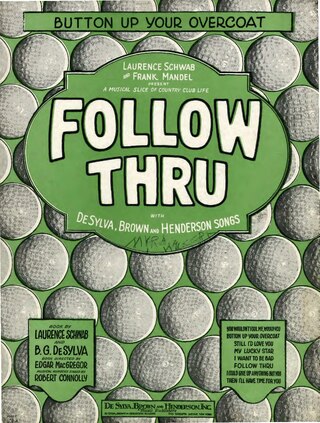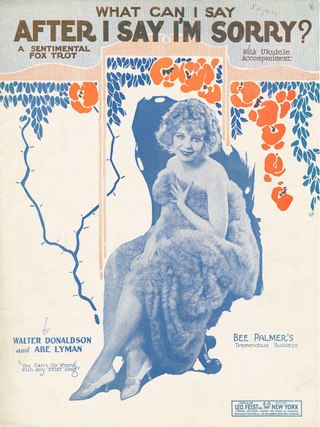Related Research Articles
"And That Reminds Me", also known as "My Heart Reminds Me", is a popular song.

"Stay" is a doo-wop song written by Maurice Williams and first recorded in 1960 by Williams with his group the Zodiacs. Commercially successful versions were later also issued by the Hollies, the Four Seasons and Jackson Browne.
"Cuddle Up A Little Closer, Lovey Mine" is a popular song. The music was written by Karl Hoschna, the lyrics by Otto Harbach. The song was published in 1908. From the Broadway musical Three Twins when it was introduced by Alice Yorke.
"Please Don't Talk About Me When I'm Gone" is a song published in 1930. It was written by Sam H. Stept with lyrics by Sidney Clare. The original publication also credited singer Bee Palmer as co-composer.
"Pennies from Heaven" is a 1936 American popular song with music by Arthur Johnston and lyrics by Johnny Burke. It was introduced by Bing Crosby with Georgie Stoll and his Orchestra in the 1936 film of the same name.
"The One I Love (Belongs to Somebody Else)" is a popular song composed by Isham Jones with lyrics by Gus Kahn. The song was recorded by Isham Jones' Orchestra on December 21, 1923, at Brunswick Studios in New York City, and published on January 7, 1924. On January 17 in Chicago, Jones recorded another version, with Al Jolson on lead vocals. Both versions made the charts that Spring, with Jolson's peaking at number 2, and Jones' at number 5. Sophie Tucker recorded her version February 1924, released on Okeh 40054.

"Button Up Your Overcoat" is a popular song. The music was written by Ray Henderson, the lyrics by B.G. DeSylva and Lew Brown. The song was published in 1928, and was first performed later that same year by vocalist Ruth Etting. However, the most famous rendition of this song was recorded early the following year by singer Helen Kane, who was at the peak of her popularity at the time. Kane's childlike voice and Bronx dialect eventually became the inspiration for the voice of cartoon character Betty Boop.
"I Had the Craziest Dream" is a popular song which was published in 1942. The music was written by Harry Warren, the lyrics by Mack Gordon.
"If You Are But a Dream" is a popular song published in 1942 with words and music by Moe Jaffe, Jack Fulton and Nat Bonx. The melody is based on Anton Rubinstein's "Romance in E flat, Op. 44, No. 1," popularly known as "Rubinstein's Romance".
"It's the Talk of the Town" is a popular song written by Jerry Livingston, the lyrics by Al J. Neiburg and Marty Symes.
"South of the Border Down Mexico Way" is a popular song describing a trip to Mexico, written by Jimmy Kennedy and Michael Carr and published in 1939 for the film of the same name starring country star Gene Autry.
For other songs with this title, see Goodnight My Love (disambiguation)
"The Lamp Is Low" is a popular song from the 1930s. The music was written by composers Peter DeRose and Bert Shefter, adapted from Pavane pour une infante défunte, a composition by Maurice Ravel. The lyrics were written by Mitchell Parish.
"Let the Good Times Roll" is a song that was recorded by Shirley and Lee in 1956. This song was written by the duo, Shirley Goodman and Leonard Lee.
"Johnny One Note" is a 1937 show tune from the 1937 Rodgers and Hart musical Babes in Arms, where it was introduced by Wynn Murray. Judy Garland sang it in the Rodgers & Hart biopic Words and Music (1948).
"Everybody Needs Somebody to Love" is a song written by Bert Berns, Solomon Burke, and Jerry Wexler, and originally recorded by Burke under the production of Berns at Atlantic Records in 1964. Burke's version charted in 1964, but missed the US top 40, peaking at number 58.
"There Are Such Things" is a popular song by Stanley Adams, Abel Baer, and George W. Meyer, published in 1942. The first and most popular version of the song was performed by Tommy Dorsey's orchestra with vocals by Frank Sinatra and The Pied Pipers, which reached No. 1 on the US best-selling records chart in 1942. This version hit No. 2 on the Harlem Hit Parade chart. There have been many other versions recorded since.

"What Can I Say After I Say I'm Sorry?" is a popular song by Walter Donaldson and Abe Lyman, published in 1926.
"For You" is a song written by Joe Burke and Al Dubin in 1930. It was introduced in the Mack Sennett short Billboard Girl (1932) when it was sung by Bing Crosby. The best known version was from musician Rick Nelson in 1964, when it peaked at #6 on the Billboard Hot 100 and at #66 on the year end.
"Home (When Shadows Fall)" is a song written by Harry Clarkson, Geoffrey Clarkson and Peter van Steeden in 1931. van Steeden had a hit with it in 1931.
References
- ↑ Whitburn, Joel (1986). Joel Whitburn's Pop Memories 1890-1954 . Wisconsin, USA: Record Research Inc. p. 137. ISBN 0-89820-083-0.
- ↑ "marthatilton.com". marthatilton.com. Retrieved January 27, 2018.
- ↑ "Discogs.com". Discogs.com. Retrieved January 27, 2018.
- ↑ "Discogs.com". Discogs.com. Retrieved January 27, 2018.